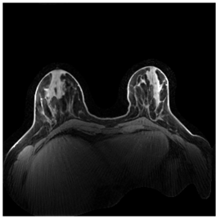Welcome to the fastMRI Dataset


Here at the Center for Advanced Imaging Innovation and Research (CAI2R), in the Department of Radiology at NYU School of Medicine and NYU Langone Health, we bring people together to create new ways of seeing. We are committed to the translation of new imaging techniques and technologies into clinical practice, for the improvement of human health. In particular, we are pushing the boundaries of rapid image acquisition and advanced image reconstruction, with the aim of providing uniquely valuable biomedical information to advance the understanding of disease and improve the care of patients.
We are partnering with Facebook AI Research (FAIR) on fastMRI – a collaborative research project to investigate the use of AI to make MRI scans up to 10X faster.
NYU Langone and FAIR are providing open-source AI models, baselines, and evaluation metrics.
The deidentified imaging dataset provided by NYU Langone comprises raw k-space data in several sub-dataset groups. Curation of these data are part of an IRB approved study. Raw and DICOM data have been deidentified via conversion to the vendor-neutral ISMRMD format and the RSNA clinical trial processor, respectively. We also performed manual inspection of each DICOM image for the presence of any unexpected protected health information (PHI), with spot checking of both metadata and image content.
Knee MRI: Data from more than 1,500 fully sampled knee MRIs obtained on 3 and 1.5 Tesla magnets and DICOM images from 10,000 clinical knee MRIs also obtained at 3 or 1.5 Tesla. The raw dataset includes coronal proton density-weighted images with and without fat suppression. The DICOM dataset contains coronal proton density-weighted with and without fat suppression, axial proton density-weighted with fat suppression, sagittal proton density, and sagittal T2-weighted with fat suppression. The exact distribution of contrasts is given in table 1. Please note that this table does not include stats about the data that was originally held back for the fastMRI reconstruction challenge.
| Field Strength | |
| PD | 697 |
| PD with fat suppression | 701 |
| Total | 1398 |
| Table 1: Number of scans for the different contrasts of the knee raw dataset. |
Brain MRI: Data from 6,970 fully sampled brain MRIs obtained on 3 and 1.5 Tesla magnets. The raw dataset includes axial T1 weighted, T2 weighted and FLAIR images. Some of the T1 weighted acquisitions included admissions of contrast agent. The exact distribution of contrasts and field strengths is given in table 2.
| Field Strength | 1.5T | 3T | |
| T1 | 382 | 409 | |
| T1 post contrast | 849 | 646 | |
| T2 | 1655 | 2524 | |
| FLAIR | 126 | 411 | |
| Total | 3012 | 3990 | 7002 |
| Table 2: Number of scans for the different contrasts and scanner field strengths of the brain raw dataset. |
Prostate MRI: Data from 312 prostate MRI exams obtained on 3 Tesla magnets. The raw dataset includes axial T2-weighted and axial diffusion-weighted images for each of the 312 exams. For more information about the prostate dataset, please refer to our article https://www.nature.com/articles/s41597-024-03252-w and code repository https://github.com/cai2r/fastMRI_prostate
Breast MRI: Data from 300 clinical breast MRI exams obtained on 3 Tesla magnets. The raw dataset includes axial DCE-MR using a 3D GRASP sequence for each of the 300 exams For more information about the breast dataset, please refer to our article https://pubs.rsna.org/doi/10.1148/ryai.240345 and code repository https://github.com/eddysolo/demo_dce_recon
The application process includes acceptance of the Data Sharing
Agreement (found below) and submission of an online application
form. The application must include the investigator’s institutional
affiliation and the proposed uses of the data. NYU fastMRI data may
be used for internal research or educational purposes only as
described in the data use agreement and may not be redistributed in
any way without prior permission.
Read and agree to the data use agreement below to apply for access.




Interested scientists may apply for access to fastMRI data for the purposes of internal research or education only.* Access is contingent on adherence to the fastMRI Dataset Sharing Agreement shown below, which also outlines policies for publication and citation. Note: This agreement is subject to updates